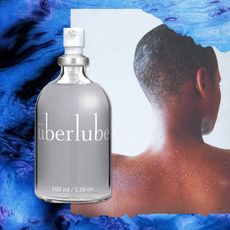
There are so many ways for us to describe sex: exciting, thrilling, empowering, spine-tingling—notice how we didn't mention "painful" or "stinging." When sex feels less than pleasurable, it can often signal a larger issue, like a bacterial infection or a psychological issue.
Terri-Ann Samuels, M.D., says that the pain can range from sharp, to stabbing, to dull depending on the issue causing it. Thankfully, talking openly about sexual issues for women is becoming less taboo, but she says it's all about knowing the right verbiage to describe them that's important.
To suss out your potential hangups, we spoke to sexologist Yvonne K. Fulbright, Ph.D. and Samuels about some common reasons women experience pain during sex. Here, a breakdown of possibilities for why you're experiencing pain and some suggestions for treatments and solutions.

Even though your vagina is a natural self-lubricator, if you haven't warmed up for sex through foreplay, are breastfeeding, or are close to menopause, you could suffer from dryness during intercourse. Diving head first into sex can create unnecessary friction between your vagina and his manhood, so it's always worth spending more time getting into the act. For chronic dryness issues, Dr. Samuels recommends a lubricant or vaginal moisturizer like Replens Silky Smooth. She also suggests methods of replenishing estrogen to the vagina for pre- and post-menopausal women, like hormone therapy and prescription treatments.
You're allergic to your sex toys or products.
While we're on the topic, you can't just go to the drugstore and buy the cheapest thing on the shelf. Fulbright notes that lubricants are made with different chemicals, which can throw off your vagina's pH balance—the same is true for products like latex condoms. If you feel any sort of irritation after use, try to stick to "natural"-based products (like Good Clean Love's line) and see how that fares with your body.
You have ingrown hairs.
Sometimes a botched bikini wax can leave you with unpleasant pimples, which can be painful when there's friction. If you're feeling the burn, load up on a skin-soothing serum and wait it out.
You have a sexual dysfunction.
Yes, though it's not often talked about, some women (often in their teens or early twenties) experience a disorder known as vaginismus—where the muscles of the pelvic floor involuntarily spasm or tighten during sex and make penetration painful or impossible. Shooting pain during sex can also be attributed to hyperactive nerve fibers around the vulva, AKA vulvodynia.
Stay In The Know
Marie Claire email subscribers get intel on fashion and beauty trends, hot-off-the-press celebrity news, and more. Sign up here.
Samuels says these dysfunctions can often have a psychological background related to abuse, trauma, or some kind of negative association with penetration. Talking to a specialist or gynecologist who can help women determine what the underlying issues are and help work though them with physical therapy is the biggest step towards recovery.
You're using the wrong positions.

Blame kama sutra books for introducing you to how-the-hell-do-they-contort-their-bodies-like-that sex positions. It's always good to experiment and deviate from your go-to routine, but the Butter Churner (Google it) might not be for everyone. According to Fulbright, a guy's curvature can make your go-to moves feel a little off from time to time.
You just gave birth.
First off, if your libido can bounce back right away after childbirth, GO YOU. But caution: It'll take your body some time to get back to its former glory. Some doctors suggest a four to six week window after childbirth as a good time frame to get your groove back, but it all depends on the individual.
You have an STD/STI/pelvic disease.
The simplest infections like yeast infections and STDs require some kind of preliminary screening, says Samuels. Fibroids on your uterus and pelvic inflammatory disease are also common concerns according to Fulbright. Know who you're sleeping with and get tested regularly if you're not in a monogamous relationship, but also take comfort in knowing there are plenty of oral and vaginal medications that can treat those. Samuels recommends a probiotic supplement for boosting vaginal health and helping stave off infections.
Your partner is too big.

No guy is ever too large-and-in-charge to wear a condom. But when it comes to penetration, a man's love gun might not fit into your, er, pistol box, says Fulbright. In a sense, you need to be "loosened" up by trying simple sex moves first—think missionary—or turning yourself on more through foreplay.
You haven't had sex in a long time.
Sex slump, dry spell, whatever you want to call it, the struggle's real. We're not saying you should jot down sex in your weekly planner, but just know it's totally normal for it to hurt if you haven't done it since Game of Thrones season 1.
You're a virgin.
On the flip side, if you've never had sex before, the first time is going to feel comparatively more uncomfortable. Getting your vagina used to penetrative sex (and learning what makes you orgasm) will come with time, but if you're still experiencing chronic pain with sex, talk to a professional.
Follow Marie Claire on Facebook for the latest celeb news, beauty tips, fascinating reads, livestream video, and more.
-
 Zendaya Says Her Experiences at the Met Gala Have Been “Exciting”—But Also “Terrifying” and “Daunting”
Zendaya Says Her Experiences at the Met Gala Have Been “Exciting”—But Also “Terrifying” and “Daunting”After a five year hiatus, Zendaya will return to the Met this year as a co-chair of the event.
By Rachel Burchfield Published
-
 Jennifer Lopez Wears the Widest Wide-Leg Denim
Jennifer Lopez Wears the Widest Wide-Leg DenimShe's redefining "puddle jeans."
By Halie LeSavage Published
-
 Melanie Lynskey Says Husband Jason Ritter Is “Sacrificing” Roles for Her Career
Melanie Lynskey Says Husband Jason Ritter Is “Sacrificing” Roles for Her Career"I think a lot of men don't have that kind of self-esteem and that respect for their partner."
By Danielle Campoamor Published
-
 The 22 Best Vibrators, According to Sex Toy Experts
The 22 Best Vibrators, According to Sex Toy ExpertsThe best options, for every preference and price range.
By Gabrielle Ulubay Last updated
-
 The Best Period Sex Tips, According to Sex Experts
The Best Period Sex Tips, According to Sex ExpertsWho says messy can't be sexy?
By Gabrielle Ulubay Last updated
-
 The 20 Best Sex Games for Couples in 2023
The 20 Best Sex Games for Couples in 2023Who said game nights need to be wholesome?
By Gabrielle Ulubay Last updated
-
 The 14 Best Lubes for Every Need
The 14 Best Lubes for Every NeedGood sex should always go smoothly.
By Gabrielle Ulubay Last updated
-
 COVID Forced My Polyamorous Marriage to Become Monogamous
COVID Forced My Polyamorous Marriage to Become MonogamousFor Melanie LaForce, pandemic-induced social distancing guidelines meant she could no longer see men outside of her marriage. But monogamy didn't just change her relationship with her husband—it changed her relationship with herself.
By Melanie LaForce Published
-
 100 Sex Songs That Won't Make You Cringe
100 Sex Songs That Won't Make You CringeDim the lights and hit play on this sex songs — the perfect playlist of songs to have sex to.
By The Editors Published
-
 75 Real Sex Scenes in Movies
75 Real Sex Scenes in MoviesThese actors aren't faking anything.
By Mehera Bonner Last updated
-
 33 Unexpected Valentine's Day 2023 Date Ideas
33 Unexpected Valentine's Day 2023 Date IdeasA.k.a. not dinner and roses.
By The Editors Published